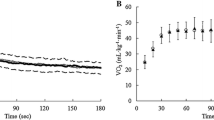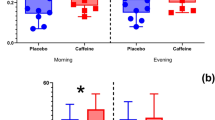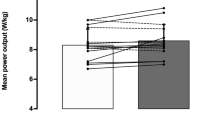Summary
The purpose of this study was to determine the effect of caffeine ingestion on physical performance after prolonged endurance exercise. Twenty three trained male volunteers participated in a 40-km march and were divided into two groups, matched for caffeine clearance rate and aerobic capacity. The experimental group ingested, prior to the march, a caffeinated drink at a dose of 5 mg·kg−1 body mass and at the 3rd and 5th h of marching an additional drink at a dose of 2.5 mg·kg−1 body mass. The control group ingested a drink of equal volume at the same times. Upon termination of the march each subject performed a cycle ergometer test at an intensity of 90% maximal oxygen consumption. Time to exhaustion and rate of perceived exertion (RPE) were recorded. Blood samples were drawn predrink, at the 3rd and 5th h of marching and immediately after the cycle ergometer test, and were analysed for caffeine, free fatty acids (FFA), lactate and glucose levels. Plasma FFA levels increased during the march (p<0.05), with no significant difference between groups. Lactate levels increased in the experimental group (p<0.05), with no significant change in the control group. Glucose levels did not change significantly in either group. After the cycle ergometer test, lactate levels were significantly higher in the experimental, as compared to the control group (3.77±0.33 vs 2.52±0.35 mmol·l−1, respectively). There was no significant difference between treatments in the time to exhaustion on the cycle ergometer, but RPE was different (p<0.05). Under the conditions of this study, the results do not indicate caffeine ingestion as an ergogenic aid which will postpone exhaustion following prolonged endurance exercise.
Similar content being viewed by others
References
Bellet S, Kershbaum A, Aspe J (1965) The effects of caffeine on free fatty acids. Arch Intern Med 116:750–752
Bellet S, Roman L, DeCastro O, Kim KE, Kershbaum A (1969) Effect of coffee ingestion on catecholamines release. Metabm 18:288–291
Berglund B, Hemmingson P (1982) Effects of caffeine ingestion on exercise performance at low and high altitudes in cross-country skiers. Int J Sports Med 3:234–236
Beutler E (1971) Red cell metabolism: a manual of biochemical methods. Grune & Stratton, New York
Borg GAV (1973) Perceived exertion: a note on “history and methods”. Med Sci Sports 5:90–93
Rutts NK, Crowell D (1985) Effects of caffeine ingestion on cardio-respiratory endurance in men and women. Res Q Exerc Sports 56 (4):301–305
Cadarette BS (1982) Effects of varied doses of caffeine on endurance exercise to fatigue. Thesis, Boston University, Boston
Casal DC, Leon AS (1985) Failure of caffeine to affect substrate utilization during prolonged running. Med Sci Sports Exerc 17:174–179
Costill DL, Dalsky GP, Fink W (1978) Effect of caffeine ingestion on metabolism and exercise performance. Med Sci Sports 10:155–158
Dill DB, Costill DL (1974) Calculation of percentage changes in volume of blood, plasma and red cells in dehydration. J Appl Physiol 37:297–298
Dole V (1956) A relation between non-esterified fatty acids in plasma and the metabolism of glucose. J Clin Invest 35:150–154
Dole V (1960) Microdetermination of long chain fatty acids in plasma and tissues. J Biol Chem 235:2595–2599
Erickson M, Schwarzkopf R, McKenzie R (1986) Effects of caffeine, fructose and glucose ingestion on muscle glycogen utilization during exercise. Med Sci Sports Exerc 18 [Suppl]:562
Essig D, Costill DL, Van Handel PJ (1980) Effects of caffeine ingestion on utilization of muscle glycogen and lipid during leg ergometer cycling. Int J Sports Med 1:86–90
Galun E, Burstein R, Assia E, Tur-Kaspa I, Rosenblum J, Epstein Y (1987) Changes of white blood cell count during prolonged exercise. Int J Sports Med 8:253–255
Gollnick PD (1988) Energy metabolism and prolonged exercise perspective in exercise science and sports medicine. In: Lamb DR, Murray R (eds) Prolonged exercise, vol. I. Benchmark Press, Indianapolis, IN. pp 1–36
Havel R (1971) Influence of intensity and duration of exercise on supply and use of fuels. In: Pernow B, Saltin B (eds) Muscle metabolism during exercise. Plenum Press, New York, pp 315–325
Hodgson DR, Bayly WM, Grant BD, Gollnick PD (1986) Effects of caffeine administration on lipolysis in exercising horses. Med Sci Sports Exerc 17:259
Ivy JL, Costill DL, Fink WJ, Lower RW (1979) Influence of caffeine and carbohydrate feedings on endurance performance. Med Sci Sports 11:6–11
Knapik JJ, Jones BH, Toner MM, Daniels WL, Evans WJ (1983) Influence of caffeine on serum substrate changes during running in trained and untrained individuals. Biochem Exerc 13:514–519
Pandolf KB, Givoni B, Goldman RF (1977) Predicting energy expenditure with loads while standing or walking very slowly. J Appl Physiol 43:577–581
Perkins R, Williams MH (1975) Effects of caffeine upon maximal muscular endurance of females. Med Sci Sports 7:221–224
Powers SK, Byrd RJ, Tulley R, Callender T (1983) Effects of caffeine ingestion on metabolism and performance during graded exercise. J Appl Physiol 50:301–307
Schade D, Simunelli C, Standerer JC, Eaton RP (1979) Caffeine induced hormonal changes during running. Fed Proc 38:944
Stoddart A, Knight EM, Nzelible G, Bond V, Green J, Browning J, Adams R (1985) Effects of caffeine on LDH activity, riboflavin and glucose levels of athletes during double work periods. Fed Proc Am Soc Exp Biol 44:1280–1285
Stryer L (1981) Biochemistry, 2nd edn. WH Freeman, San Francisco.
Van Handel P (1983) Caffeine. In: Williams MH (ed) Ergogenic aids in sports. Human Kinetics, Champaign, IL
Winder WM (1986) Effects of intravenous caffeine on liver glycogenolysis during prolonged exercise. Med Sci Sports Exerc 18:192–196
Author information
Authors and Affiliations
Additional information
This work was presented, in part, at the Canadian Association of Sports Sciences Annual Meeting, October 1987, Lake Louise, Alberta, Canada
Rights and permissions
About this article
Cite this article
Falk, B., Burstein, R., Ashkenazi, I. et al. The effect of caffeine ingestion on physical performance after prolonged exercise. Europ. J. Appl. Physiol. 59, 168–173 (1989). https://doi.org/10.1007/BF02386182
Accepted:
Issue Date:
DOI: https://doi.org/10.1007/BF02386182




